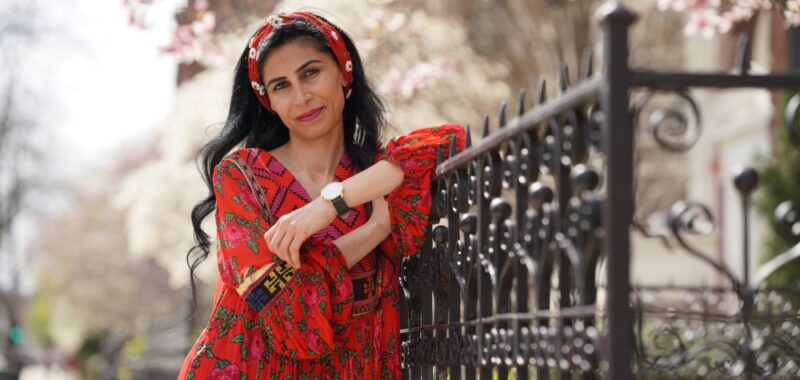LONDON — Time has played a funny role in Leyla Uysal’s life, the founder of the watch brand Bajer.
She has often found herself at the wrong place at the right time, which is how she accidentally ended up in Boston in 2012 after fleeing her day job at an urban planning firm in Istanbul.
“Google Translate wasn’t that advanced in 2012 and I couldn’t speak English. I misunderstood an email from Harvard University; I thought I was invited to the university [to study],” said Uysal, retelling the story of how a landscape architecture professor was encouraging her to visit the campus.
“I fell in love with the city right away and I realized it might be a good thing to stay to work on my English,” she recalls, adding that a year later she met her husband and they were engaged two weeks later.

A watch from Bajer.
M.Cheraghchi
Uysal admits that the grip on her ambitions to study loosened as she built a family with her husband as they settled in Cambridge, Mass.
“Even though I call myself a modern woman, I [only] became more independent later in life, but there was still a big fire in me,” she said.
Uysal reached a tipping point in 2018, where she was a stay-at-home mother looking after her two children and had become an Airbnb host. One day she grabbed a sketchbook and drew a watch.
She had found her Eureka moment and the first person she called was a former Airbnb guest, Roberto, an Italian motorcycle designer who she had become friends with.

A Bajer watch.
M.Cheraghchi
“He was always telling me that for some reason Italians are very much similar to the Kurdish people. He had this admiration for the Kurdish woman for their courage and resistance. He was always telling me that [there’s more to me] than being a stay-in mom,” said Uysal, who spent a couple of months revisiting her ideas.
“I’m a designer, but not a product designer,” she said.
Uysal holds a degree in city and regional planning from the Turkish architecture school Mimar Sinan Fine Arts University.
“Then I remembered when I was 10 or 12, my mother would always translate conversations between me and my grandmother because she spoke Kurdish and I spoke Turkish — the Kurdish language was banned in Turkey. My grandmother would say, ‘I wish she knew how to weave a rug, so I would be able to understand her,’” said Uysal, who was always baffled by this remark.

The carpet-weaving technique that remains a long-standing tradition in Kurdish culture.
M.Cheraghchi
She finally found meaning in her grandmother’s riddled wisdom and now uses the carpet-weaving technique that remains a long-standing tradition in Kurdish culture to the present day on the strap of her watches.
Bajer, which translates to city in Kurdish, is made up of four collections with each one named after ancient Kurdish places: Artemita, Basenia, Corduene and Sophene.
The watches are priced from $995 to $3,290 with each caseback engraved to say “Kurdish Inspired, Italian Designed, Swiss Made.”
“It’s a quality Swiss watch, that was important for me and for the brand to be recognised that way,” said Uysal.
She used this creative journey to dive deeper into her own roots. She found a secondhand bookstore on Instagram that was selling old maps and books that spoke about Kurdistan and then found a few American authors who had written on the subject.

The carpet-weaving motif found on Bajer’s watches.
M.Cheraghchi
“The Kurdish arts and crafts are being hidden or destroyed by the Turkish identity. At 30 years old, I started to realize that I had no idea who I was or what my culture looks like,” she said.
Uysal was born in Suruc, a town in the Kurdish region of Turkey that borders Syria, but her family moved to Istanbul when she was in her 20s.
She speaks candidly about being an outcast in Turkey.
“One of the reasons I ran away was because I got fired from my job for being Kurdish,” said Uysal.
She has used all her anger and trauma she’s faced into developing her brand.
“This is a platform to introduce the Kurdish people’s strength, beauty and intellect to the world — especially the Kurdish women. In America, when you say you’re Kurdish, people respond with admiration and kindness,” said Uysal.
According to a report from the U.S.-based Council on Foreign Relations, “Kurds are one of the world’s largest peoples without a state, making up sizable minorities in Iran, Iraq, Syria, and Turkey. Their century-old fight for rights, autonomy, and even an independent Kurdistan has been marked by marginalization and persecution.”

The back of a Bajer watch.
Courtesy of Bajer
Uysal proudly calls Bajer a Kurdish-American company and hopes that in the future, when the brand has become more established, she can use Kurdish artisans.
Bajer’s biggest market to date is the U.S. followed by Europe, which the U.K. also makes a big part of.
“I have received so many messages from people [in the Middle East] telling me they are so proud. I’m going to wait to establish the brand in the Western market before I move to other markets,” said Uysal.
She often finds herself coming back to an idiom that’s used in Turkey, which is “geography is your fate.”
In starting Bajer, Uysal has found much more about herself and where she’s from.

